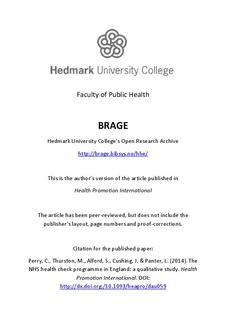| dc.contributor.author | Perry, Catherine | |
| dc.contributor.author | Thurston, Miranda | |
| dc.contributor.author | Alford, Simon | |
| dc.contributor.author | Cushing, Jill | |
| dc.contributor.author | Panter, Lee | |
| dc.date.accessioned | 2014-09-11T07:54:35Z | |
| dc.date.available | 2014-09-11T07:54:35Z | |
| dc.date.issued | 2014-07-29 | |
| dc.identifier.citation | Perry, C., Thurston, M., Alford, S., Cushing, J. & Panter, L. (2014). The NHS health check programme in England: a qualitative study. Health Promotion International. DOI: http://dx.doi.org./10.1093/heapro/dau059 | nb_NO |
| dc.identifier.issn | 1460-2245 | |
| dc.identifier.uri | http://hdl.handle.net/11250/219302 | |
| dc.description | This is a pre-copyedited, author-produced PDF of an article accepted for publication in Health Promotion International following peer review. The version of record Perry, C., Thurston, M., Alford, S., Cushing, J. & Panter, L. (2014). The NHS health check programme in England: a qualitative study. Health Promotion International. DOI: http://dx.doi.org./10.1093/heapro/dau059 is available online at http://heapro.oxfordjournals.org/. | nb_NO |
| dc.description.abstract | Despite an extensive evidence-base linking patterns of health with social determinants, recent public health policy has emphasized ‘lifestyle diseases’ and risk factor modification through behavioural and pharmacological intervention. In England, one manifestation of this has been the launch of the National Health Service Health Check programme. This paper reports findings from a small-scale qualitative study exploring experiences of engaging with a community-based health check in Knowsley, England, among 17 males and 19 females, with varying levels of risk for cardiovascular disease, who agreed to be contacted for the purpose of research at the time they underwent their check. Analysis revealed that the community-based nature of the checks provided opportunities for people to find out more about their health who might not otherwise have done so. Participants expressed a range of responses to the communication of the risk score, often revealing their confusion about its meaning. Changes in behaviour were identified, which participants connected with having had a check. This study raises questions about where, how and by whom health checks are delivered. Emphasis on health checks reflects the dominant individualist ideology, but this study also suggests that the process provides opportunities to enable and empower individuals, albeit in small ways. However, they remain a ‘downstream’ approach to public health, emphasizing medical and behavioural options for risk factor reduction rather than focussing on primary prevention through changes to the wider environment. Furthermore, although developed as a central feature of the UK's strategy to reduce health inequalities, health checks may widen them. | nb_NO |
| dc.language.iso | eng | nb_NO |
| dc.publisher | Oxford University Press | nb_NO |
| dc.rights | Navngivelse-Ikkekommersiell-IngenBearbeidelse 3.0 Norge | * |
| dc.rights.uri | http://creativecommons.org/licenses/by-nc-nd/3.0/no/ | * |
| dc.title | The NHS health check programme in England: a qualitative study | nb_NO |
| dc.type | Journal article | nb_NO |
| dc.type | Peer reviewed | nb_NO |
| dc.subject.nsi | VDP::Medical disciplines: 700::Health sciences: 800 | nb_NO |
| dc.subject.nsi | cardiovascular | nb_NO |
| dc.subject.nsi | health behaviour | nb_NO |
| dc.subject.nsi | heart health promotion | nb_NO |
| dc.subject.nsi | qualitative methods | nb_NO |
| dc.source.journal | Health Promotion International | nb_NO |
| dc.identifier.doi | 10.1093/heapro/dau059 | |

